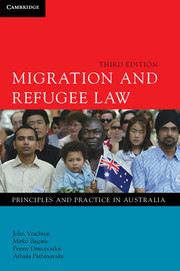Book contents
- Frontmatter
- Contents
- Table of cases
- Table of statutes
- Preface to the third edition
- Acknowledgments
- 1 Historical context to migration
- 2 Immigration control: An overview
- 3 Basic migration legislation and policy
- 4 The visa system and application procedures
- 5 Family and interdependency migration and other Australia-based visas
- 6 Business and investment visas
- 7 Skills-based visas
- 8 Temporary visas
- 9 Miscellaneous visas
- 10 Common visa requirements
- 11 Compliance: Unlawful non-citizens, removal and deportation
- 12 History of the Refugees Convention and definitional framework
- 13 Refugee and humanitarian visas: The statutory structure
- 14 Convention grounds
- 15 Persecution
- 16 Well-founded fear of persecution
- 17 Limits on protection of refugees – cessation, exclusion exceptions and protection by another country
- 18 Time for a fundamental rethink: Need as the criterion for assistance
- 19 The determination and review process for migration and refugee decisions
- Index
- References
16 - Well-founded fear of persecution
Published online by Cambridge University Press: 05 June 2012
- Frontmatter
- Contents
- Table of cases
- Table of statutes
- Preface to the third edition
- Acknowledgments
- 1 Historical context to migration
- 2 Immigration control: An overview
- 3 Basic migration legislation and policy
- 4 The visa system and application procedures
- 5 Family and interdependency migration and other Australia-based visas
- 6 Business and investment visas
- 7 Skills-based visas
- 8 Temporary visas
- 9 Miscellaneous visas
- 10 Common visa requirements
- 11 Compliance: Unlawful non-citizens, removal and deportation
- 12 History of the Refugees Convention and definitional framework
- 13 Refugee and humanitarian visas: The statutory structure
- 14 Convention grounds
- 15 Persecution
- 16 Well-founded fear of persecution
- 17 Limits on protection of refugees – cessation, exclusion exceptions and protection by another country
- 18 Time for a fundamental rethink: Need as the criterion for assistance
- 19 The determination and review process for migration and refugee decisions
- Index
- References
Summary
Overview
The notion of a well-founded fear is one of the constituent elements of the definition of a refugee. In Chan v MIEA the High Court held that ‘well-founded fear’ has both a subjective and an objective element:
The phrase ‘well-founded fear of being persecuted’…contains both a subjective and an objective requirement. There must be a state of mind – fear of being persecuted – and a basis – well-founded – for that fear.
It is important to emphasise that in determining whether a fear of persecution is well-founded the relevant point of inquiry is at the time when the decision is made, not at the point at which the applicant left his or her country, and must take into account not the current situation but what is likely to occur in the reasonably foreseeable future.
The subjective element
The subjective element focuses on the perceptions of the individual regarding the risk involved in returning to the relevant country. The applicants’ personal beliefs regarding the dangers awaiting them in their country of origin are rarely a defining consideration in the determination of refugee status. The best evidence of what an applicant believes is obviously his or her express comments on the subject matter. It is difficult to reject an applicant's claim that he or she fears persecution. This is especially so given that this belief does not need to have a rational basis. Nevertheless, in some cases a fact finder may be entitled to reject such an assertion on the basis that it is disingenuous. Examples are where the applicant voluntarily and regularly visits his or her country of origin or where there is absolutely no evidential basis for the fear.
- Type
- Chapter
- Information
- Migration and Refugee LawPrinciples and Practice in Australia, pp. 257 - 269Publisher: Cambridge University PressPrint publication year: 2011



